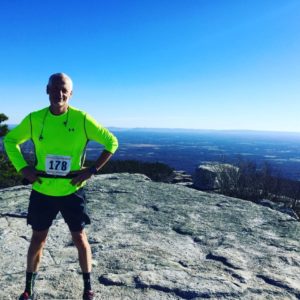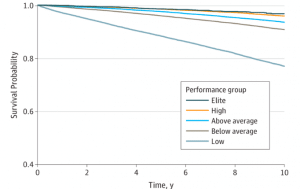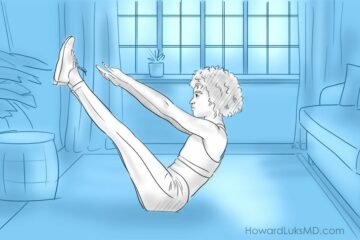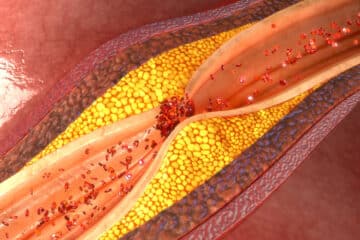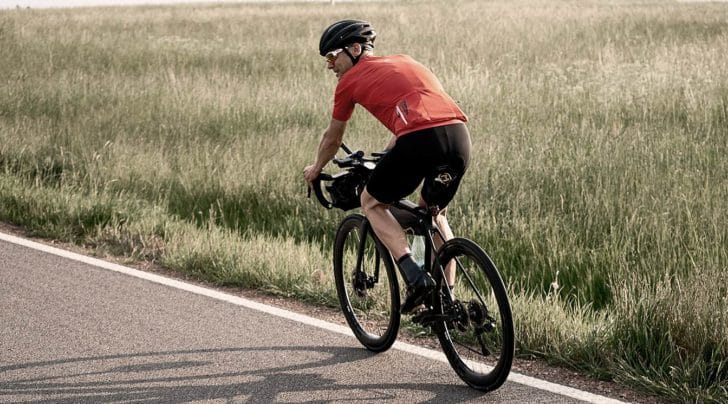
We are going to review an exciting paper on the topic of fitness. Not specific exercises or diets, just aerobic fitness. It’s not a secret that aerobic fitness leads to a longer life for many. Some athletes were warned that achieving an elite level of fitness could be harmful. I personally think that living better and healthier throughout the years we have should be our goal. I envy those who are sharp of mind, walking under their own power and heading into their 80’s with vigor and vitality.
A recent study published in JAMA gives a lot to think about. The study, “Association of Cardiorespiratory Fitness With Long-term Mortality Among Adults Undergoing Exercise Treadmill Testing,” demonstrated that the more we exercise, the more fit we are and the less chance there was that we were going to die. In this study, there was a direct correlation between fitness level and a decrease in the risk of dying from anything— or what the scientific community calls “all-cause mortality.” Now, we all know that our risk of dying in life is 100%. No magic there… but this paper is essential because we do not want to hit our later years using a walker, carrying an insulin syringe or 6 separate cardiac medications. We want to live better.
People who are more physically fit tend to live longer
For those who do not exercise this paper is sobering news. This should offer yet another reason to stand up and start walking. Most people know that lack of exercise is bad for their health. What they do not understand is how bad it is. This study showed that for those with very poor aerobic fitness, your risk of dying from any reason (all-cause mortality) was HIGHER than the risk of dying if you were a smoker, had diabetes or coronary artery disease (atherosclerosis). Again, the mortality risk (risk of dying) associated with a low level of cardiac or aerobic fitness is higher than the mortality risk of smoking, atherosclerosis, and diabetes.
Furthermore, this study showed that an improved level of cardiac aerobic fitness significantly decreases your all-cause mortality risk. That means walking alone will improve your health dramatically. I have discussed the concept of “making your day a little harder” before. It is simple. Do not park close to your destination. Choose the spot farthest away and walk to the entrance. Find the stairs. Do not take the elevator one or two flights up. Get up and walk around your job site or office a few times a day. Sit and stand 10 times before finally sitting. Just make your day a little harder, and you will make your heart a lot happier. It’s not only your heart that benefits. An increase in aerobic fitness decreases your risk of coronary artery disease, hypertension, diabetes, metabolic syndrome, non-alcoholic fatty liver, and so on. You get the picture. And just because you may have one of those issues I mentioned is not a reason to sit still and give up. With proper diet and exercise, you may reverse many of those issues mentioned.
Your level of fitness matters more than the time spent exercising
More is not always better. We can become fit without having to exercise ourselves to exhaustion every day. Drinking water is healthy too, but drinking gallons a day is not. Achieving aerobic fitness will take some effort. And the method you choose will be the one you enjoy most. Walking, swimming, spinning, yoga, dance, cycling and running all have their place. Within reason.
It is also of the utmost importance that you respect your bodies need to recover. Recovery is a weapon for those who compete. Proper sleep… hopefully 8 hours per day is optimal for most. Adequate nutrition is vital so your body can perform the repairs it needs to following daytime activity. Again, it is important to keep in mind, this study looked at people’s level of fitness, NOT the activity they utilized to get there. It was fitness that granted this decreased risk of disease, not a specific activity and certainly not the total amount of time exercising. So, fitness appears to have a big influence on longevity and living better, but how that aerobic fitness is achieved and maintained matters too!
It is possible to achieve a desired level of fitness without crushing yourself everyday.
For those who are interested, this paper also studied these subjects and recorded their BMI, and their cholesterol and LDL levels. Perhaps not surprisingly, the authors found that the fittest among us had the lowest BMI. But, they found that the fittest had higher cholesterol and LDL readings too.
Over the next few weeks and months, as I start to concentrate on this Live Better strategy, we will discuss this in much further detail. As you have all heard, your cholesterol number alone is not a great predictor of cardiac disease or heart attacks. People with normal cholesterol levels are dying of heart attacks, and people with levels > 300 aren’t. Our bodies are very complex organisms. Your cholesterol level is not a great predictor when looked at in isolation. Your body’s level of inflammation, triglycerides, small particle LDL and other parameters help us craft a better assessment of your overall metabolic stability. So someone with triglycerides that are through the roof, but a cholesterol level of 180 probably has a higher chance of cardiac issues than someone with much more normal triglycerides. Again… we will dive much further into this over the next few months. So subscribe and stay tuned.
Extreme fitness, not extreme duration is best…
n exciting part of this study was that people with “extreme” or elite level fitness were found to have a lower chance of dying than others at a lower level of fitness. That’s interesting. Previous studies have shown a “U” shaped curve. Those who didn’t exercise and those who exercised “too much” had similar chances of dying from a cardiac issue. Only those who exercised “moderately” had a lesser chance of disease and death from cardiac disease.
Granted… this only applies to a minimal number of people who are out there pounding the pavement every day or even twice a day. But it’s good news because once we catch the exercise bug, we may not need to worry about the amount that we exercise. Now, keep in mind. This paper only discussed people’s level of fitness, not how they achieved that level of fitness. People in this paper with an elite level of fitness might not have been running 100 miles a week. Perhaps it was a few high-intensity sessions per week. Previous research is pretty clear in this area. People who run ultra-marathons, or who exercise too much do seem to run into an issue of diminishing returns, and possibly a problem with not being as “healthy” as they think they are.
Your fitness level matters … a lot. You can do this.
The take-home message of this post is simple. Your aerobic or cardiac fitness matters. And it matters a lot. How you achieve that level matters for some (extreme elite athletes), but for the rest of us, it simply matters that we start to make our days a little harder. We walk more, we take the stairs, we join our friend at their yoga class and make an effort to improve our chance of living longer by simply trying to be more active each and every day
